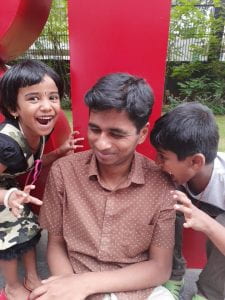
Prioritising family
Although I was relieved to be able to split my internship into two parts and still go on holiday, I was slightly disappointed that I would have little time at home in London during my summer because the plan was to return to Bristol after getting back to England.
Furthermore, holidays in India with my family aren’t completely relaxing for me. We normally visit India once every two years for 3-5 weeks with the sole intention to meet and spend time with family. There are two main challenges with this. Firstly, in our culture we tend to stay in touch with more distant family members – some are so distant that I sometimes forget their relation to me. Secondly, as time has gone on these family members have become more dispersed within the country. Consequently, this means that we have to do a lot of travelling within a short space of time so we never stay in one place for more than a couple of days.
Despite this, I still very much enjoy going to India since its nice to be reminded that there are so many family members who care about my family and I, which is a sharp contrast to London where my family is limited to just my brother and parents. Hence, emotionally the trip is quite refreshing but physically the climate and the travelling can be quite taxing.

Within the 5 weeks I was there, I visited 6 places of which most are within the state of Tamil Nadu. Chennai, Hyderabad, Bangalore and Thanjavur are probably the most well-known places I visited. Chennai is the capital of Tamil Nadu and had been in the news in recent years because of water shortages and flooding. Hyderabad and Bangalore are in a different state and have a much cooler climate than Chennai but like Chennai are big well developed cities. Thanjavur is also a city but not as well developed as Chennai. It is most famous for a 11th century temple constructed by RajaRaja – the emperor of the Chola empire and I have been fortunate enough to visit it several times. However, prioritising family visits means there is never much time for sightseeing.
Differing ways of life
Nevertheless, going to visit family in India over the years has allowed me to experience different ways of life. Of course it is impossible to ignore the poverty in India. Visiting India over the years I’ve seen much development in technology and infrastructure but I never seem to see the levels of poverty get any better despite what the statistics say. Similarly, the state of public education seems to be on the decline with classes getting bigger and the number of teachers getting smaller. Even though hearing and observing such struggles are always difficult it has and continues to make me more grateful of my life in England especially through difficult times.
As a consequence, many of my relatives have different priorities when it comes to choosing a career. The stereotypical idea is that Indians want their children to be either one of two things – a Doctor or an engineer. If these aren’t possible then a career to do with computer or software engineering will suffice. To a great extent this stereotype is true. I believe this is because these jobs generally offer a good pay and for a people who have generally grown up without much wealth, like my parents, a good salary was desperately needed to support their family. Unfortunately, this attitude still exists among those who have obtained this necessary wealth. Hence, I still find it quite apprehensive to explain to my relatives what I study because I know invariably the next question would be ‘What job could that get you?’ followed reliably by the question ‘Will that be good pay?’ In academia, at least in the beginning, the pay is not proportionate to the working hours. So I know if I answer these questions honestly I’ll be met with disappointment. It could be said that this could lead to an interesting conversation about how much we should pursue money in our lives and what is a happy and worthwhile life but I’m not sure how fruitful that conversation would be. On my part, I believe we should pursue money as much as it gives us ‘leisure with security’ (Bertrand Russell-Conquest of Happiness) and if the job I’m doing is something I find fun then I don’t think I would need much leisure to be happy.
The role of religion

Another obvious difference between London and India is the role of religion. From my experience, for the average person in London religion has almost no role in daily affairs but in India it does. Most of my family there are religious. Of course, some are more strict than others. When I was much younger I always wondered how some members of my family, could be firm atheists and get along so well with strict theists. In turns out there is nothing special to it. My Dad calls it ‘a matured theism and a cultured atheism’. He, along with his brothers, were brought with a ‘healthy theism and nourishing atheism’. They would be taken to temples, would sing religious songs and celebrate religious festivals despite their father being an atheist. This prevented their atheism from being blind to the attraction of religion such as its ability to give meaning to peoples lives. Likewise the religious members of my family are not blind in their belief and in some conversations have accepted the limitations in their religious systems. I believe it’s this humility and honesty combined with some common sense in practical affairs that has led to this tolerance. I’m not usually inclined to feel pride but I do feel proud of my family (both immediate and extended) on this matter. Something which I cannot say for India as a whole at this moment.
Who, who is God? You, me are God
This life is a penance, where Love is God
For the people who believe in God (theists), God is love
For the people who don’t (atheists) but preach goodness, love is their God
(Translated lyrics from a Tamil song called Anbe Sivam)


